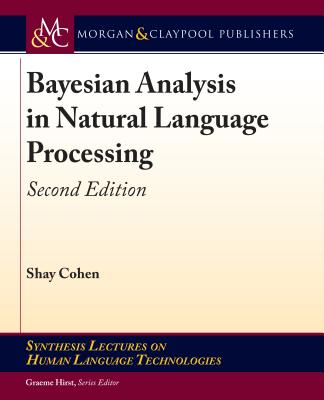Bayesian Analysis in Natural Language Processing, 2/e (Paperback)
暫譯: 自然語言處理中的貝葉斯分析,第二版 (平裝本)
Cohen, Shay, Hirst, Graeme
- 出版商: Morgan & Claypool
- 出版日期: 2019-04-09
- 售價: $3,360
- 貴賓價: 9.5 折 $3,192
- 語言: 英文
- 頁數: 343
- 裝訂: Hardcover - also called cloth, retail trade, or trade
- ISBN: 1681735288
- ISBN-13: 9781681735283
-
相關分類:
Natural Language Processing
-
相關翻譯:
自然語言處理中的貝葉斯分析, 2/e (Bayesian Analysis in Natural Language Processing, 2/e) (簡中版)
商品描述
Natural language processing (NLP) went through a profound transformation in the mid-1980s when it shifted to make heavy use of corpora and data-driven techniques to analyze language.
Since then, the use of statistical techniques in NLP has evolved in several ways. One such example of evolution took place in the late 1990s or early 2000s, when full-fledged Bayesian machinery was introduced to NLP. This Bayesian approach to NLP has come to accommodate various shortcomings in the frequentist approach and to enrich it, especially in the unsupervised setting, where statistical learning is done without target prediction examples.
In this book, we cover the methods and algorithms that are needed to fluently read Bayesian learning papers in NLP and to do research in the area. These methods and algorithms are partially borrowed from both machine learning and statistics and are partially developed "in-house" in NLP. We cover inference techniques such as Markov chain Monte Carlo sampling and variational inference, Bayesian estimation, and nonparametric modeling. In response to rapid changes in the field, this second edition of the book includes a new chapter on representation learning and neural networks in the Bayesian context. We also cover fundamental concepts in Bayesian statistics such as prior distributions, conjugacy, and generative modeling. Finally, we review some of the fundamental modeling techniques in NLP, such as grammar modeling, neural networks and representation learning, and their use with Bayesian analysis.
商品描述(中文翻譯)
自然語言處理(NLP)在1980年代中期經歷了一次深刻的轉變,當時它開始大量使用語料庫和數據驅動技術來分析語言。
自那時以來,NLP中統計技術的使用已經以多種方式演變。其中一個演變的例子發生在1990年代末或2000年代初,當時完整的貝葉斯機制被引入到NLP中。這種貝葉斯方法已經能夠彌補頻率主義方法的各種不足,並使其更加豐富,特別是在無監督的環境中,統計學習是在沒有目標預測示例的情況下進行的。
在本書中,我們涵蓋了流利閱讀NLP中貝葉斯學習論文和在該領域進行研究所需的方法和算法。這些方法和算法部分借鑒自機器學習和統計學,部分則是在NLP中“內部”開發的。我們涵蓋了推斷技術,如馬爾可夫鏈蒙特卡羅取樣和變分推斷、貝葉斯估計和非參數建模。針對該領域的快速變化,本書的第二版新增了一章關於貝葉斯背景下的表示學習和神經網絡。我們還涵蓋了貝葉斯統計中的基本概念,如先驗分佈、共軛性和生成建模。最後,我們回顧了一些NLP中的基本建模技術,如語法建模、神經網絡和表示學習,以及它們在貝葉斯分析中的應用。
作者簡介
Shay Cohen is a Lecturer at the Institute for Language, Cognition and Computation at the School of Informatics at the University of Edinburgh. He received his Ph.D. in Language Technologies from Carnegie Mellon University (2011), his M.Sc. in Computer Science from Tel-Aviv University (2004) and his B.Sc. in Mathematics and Computer Science from Tel-Aviv University (2000). He was awarded a Computing Innovation Fellowship for his postdoctoral studies at Columbia University (2011-2013) and a Chancellor's Fellowship in Edinburgh (2013-2018). His research interests are in natural language processing and machine learning, with a focus on problems in structured prediction, such as syntactic and semantic parsing.
作者簡介(中文翻譯)
Shay Cohen 是愛丁堡大學資訊學院語言、認知與計算研究所的講師。他於2011年在卡內基梅隆大學獲得語言技術的博士學位,2004年在特拉維夫大學獲得計算機科學的碩士學位,以及2000年在特拉維夫大學獲得數學與計算機科學的學士學位。他曾獲得計算創新獎學金,於哥倫比亞大學進行博士後研究(2011-2013),並於愛丁堡獲得校長獎學金(2013-2018)。他的研究興趣包括自然語言處理和機器學習,專注於結構預測中的問題,例如句法和語義解析。










